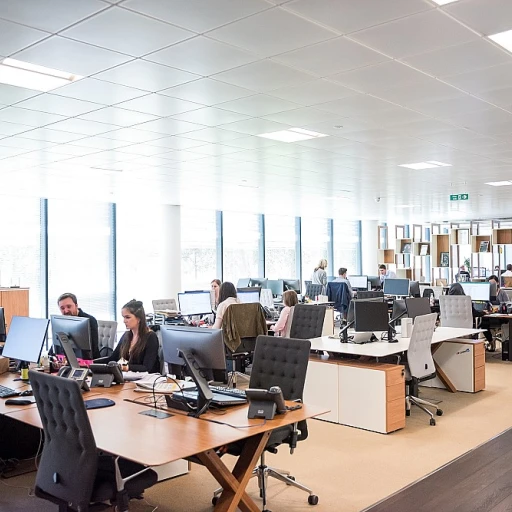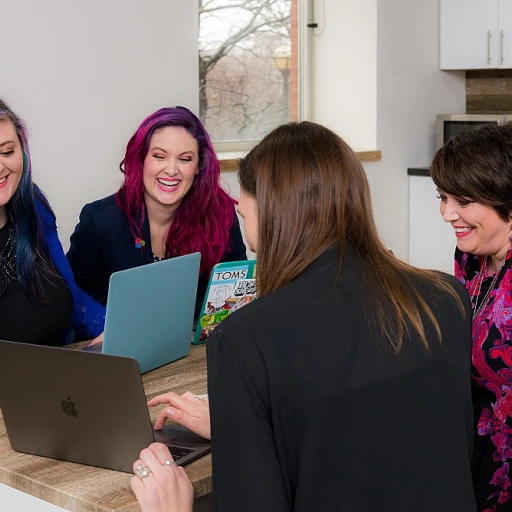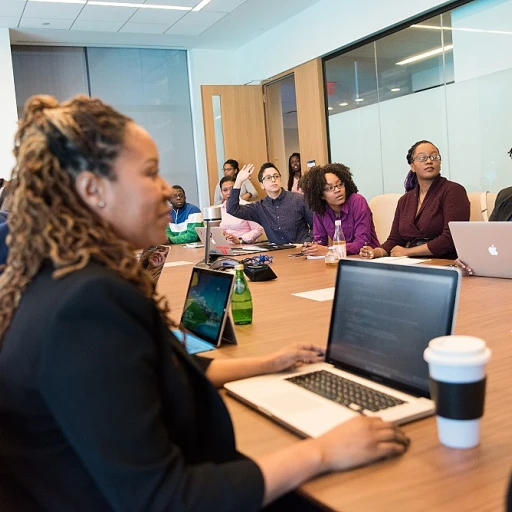Understanding the Role of Interview Questions in Succession Planning
Role of Thoughtfully Designed Interview Questions
When it comes to succession planning, thoughtfully designed interview questions play a crucial role in identifying potential successors. The interview process is not just about filling immediate vacancies, but about considering long-term growth and stability of the company. It gives companies a chance to assess candidate skills, including problem solving, decision making, and work style, ensuring they align with the company culture.
Strategically crafted interview questions will help a company to effectively assess candidates. By focusing on both technical and soft skills, interview questions help to ensure candidates are evaluated on a broad spectrum of abilities. This approach describes the candidate's potential to excel in different roles, especially under pressure.
Behavioral interview questions are especially useful in uncovering how candidates have handled situations in the past, providing insight into their problem-solving approach and team interaction. For instance, asking candidates to describe a time they overcame a challenge can reveal their resilience and innovation.
Ultimately, the best interview questions are those that not only evaluate competence for the current role but also gauge a candidate's potential for future growth within the company. This strategic interview planning will help ensure that the succession planning process is robust and effective.
Key Attributes to Identify in Potential Successors
Identifying Key Attributes in Potential Leaders
Understanding the key attributes to look for in potential successors plays a crucial role in the interview process. As you formulate interview questions, consider how they can reveal both the hard and soft skills critical for future leadership roles.
It's important to evaluate a candidate's work style and how it aligns with your company culture. Look for evidence of decision making and problem solving abilities, as these are indicative of a strong leader. A well-constructed interview question can help assess these attributes effectively.
Consider the following attributes when crafting your questions:
- Problem Solving Skills: Ask candidates to describe a time when they faced a major challenge at work and how they approached the situation. This will help you gauge their analytical thinking and strategic approach.
- Communication: A question about a previous experience working in a team can reveal much about a candidate's ability to share ideas clearly and collaborate effectively.
- Decision Making: Inquire about a decision they made that positively influenced their team or company. Their answer will help you assess their judgment and leadership potential.
- Adaptability: Changing company environments require flexibility. Ask candidates to share an experience where they had to rapidly adapt to changes, illustrating how they handle evolving scenarios.
These questions will help you not only understand the candidate's past experiences but also how those experiences translate into future performance in a leadership role. By focusing on these key attributes, you are setting the stage for a succession planning interview that selects the best candidates for long term success.
Types of Interview Questions to Consider
Exploring Different Question Types for a Comprehensive Evaluation
Succession planning is crucial for ensuring the continuous growth and sustainability of an organization. One key element of this process is strategically designing interview questions to effectively evaluate potential successors. To achieve this, integrating various types of questions offers a well-rounded assessment of candidates, highlighting their qualifications and suitability for the role.
Understanding that different question types elicit different insights is essential. Here are a few types to consider during the interview process:
- Behavioral Interview Questions: These questions help to gauge a candidate's past experiences and how they handled specific situations. Asking questions like "Describe a time when you led a team through a challenging project" can reveal critical insights into the candidate’s leadership skills and work style, which are vital for long-term success in leadership roles.
- Situational Interview Questions: By presenting hypothetical scenarios, these questions assess a candidate's decision-making and problem-solving abilities. Questions such as "If the company's main project falls behind schedule, how would you approach resolving this issue?" allow interviewers to evaluate the candidate’s strategic thinking and ability to adapt to potential challenges.
- Skill-Based Questions: Specific questions focusing on the candidate's technical skills can help ascertain their ability to perform key tasks pertinent to the role. Inquiries like "Share your experience with project management software" provide clarity on the candidate’s skills and their direct applicability to the company’s needs.
Crafting a blend of these questions for each job interview not only offers a detailed assessment of the candidates but also aligns the interview process with the organization's internal goals and company culture. In turn, this ensures that the best interview outcomes are achieved, with successors who can confidently contribute to the company's success. For more insights into mastering the art of succession for essential roles, check out this comprehensive guide:
mastering the art of succession for essential roles.
Crafting Questions for Different Levels of Leadership
Adapting Strategies for Various Levels of Leadership
Crafting interview questions that offer insight into a candidate's potential as a future leader requires a nuanced approach, especially when considering different levels of leadership within your organization. Each position demands a particular set of skills and experiences, and your interview process should align with these criteria.
For entry-level and mid-management positions, focus on identifying candidates' ability to work effectively within a team. Questions should assess the candidate’s soft skills, such as communication and adaptability, as well as their aptitude for problem-solving and decision-making.
Candidates at this level might be asked to "describe a time" when they had to navigate complex team dynamics or adapt to unexpected changes in a project. These questions help assess how well a candidate might fit into the company culture and work style.
When interviewing for senior leadership roles, questions should delve into the candidate's vision and strategic thinking. It's crucial to understand how they plan to contribute to the long-term goals of the company. Ask candidates to "describe a strategic decision" they made and its impact on their previous organization. Their answers will help reveal their approach to leadership and decision-making under pressure.
The best interview questions for executive roles should challenge candidates to demonstrate their ability to inspire and guide teams toward shared goals. This could include asking them to share examples of how they've fostered innovation or driven cultural change in the past.
Ultimately, crafting questions that are tailored to the specific demands of each leadership level will help prioritize candidates whose skills and leadership style align with the long-term vision of your organization, ensuring a smoother succession planning process.
Common Mistakes to Avoid in Interview Question Design
Avoiding Common Pitfalls in Interview Question Design
Formulating effective interview questions is a crucial element of any strategic interview process. However, common mistakes can derail this process, leaving the company with an inaccurate assessment of potential candidates. As you build your interview questions for succession planning, here are some common pitfalls to avoid:
- Overly General Questions: While broad questions may seem adaptable to various roles, they often fail to elicit specific, useful information. Instead, focus on questions that target the specific skills and experiences relevant to the job at hand.
- Leading Questions: Questions that hint at a preferred answer can undermine the authenticity of the candidate's response. Rather than asking, "Do you agree that teamwork is the best approach?", opt for "Can you describe a time when you worked successfully within a team?"
- Overemphasizing Technical Skills: While technical skills are essential, don't forget to assess soft skills that define leadership and company culture fit. Questions that explore problem-solving, decision-making, and interpersonal interactions can provide a more holistic view of a candidate's potential.
- Ignoring Behavioral Questions: Behavioral interview questions can help uncover how candidates might behave in real work scenarios based on past experiences. Incorporate these to obtain concrete examples of the candidate's work style and adaptability.
- Not Tailoring Questions to the Role: Ensure your questions are specifically aligned with the role’s demands and company expectations. Customizing questions to reflect the position and its challenges will help in accurately assessing a candidate’s fit.
Creating interview questions that go beyond these common mistakes will help ensure the interview process is both insightful and effective, providing the company with candidates best suited for future leadership roles.
Evaluating Responses Effectively
Analyzing Responses for a Holistic View
To successfully evaluate responses from candidates, consider a comprehensive approach that goes beyond just the content of their answers. An effective succession planning process thrives on the understanding of each candidate's suitability and potential for growth within a company.
Employers should look for several key indicators when candidates respond to interview questions. This involves listening to how they describe time management in previous jobs, especially in role-specific scenarios. Questions that help candidates share their strategic interview experiences can reveal their analytical thinking and suitability for leadership roles.
- Behavioral Insights: When candidates discuss their decision-making process, they reveal much about their soft skills and problem-solving abilities. These insights can be crucial in assessing how an individual will work within your team and align with company culture.
- Depth and Substance: Evaluate whether candidates can articulate clear and well-structured answers. Good interview questions should prompt them to provide specific examples of their previous work experiences. Answers that include detailed narratives are usually more telling than generic responses.
- Consistency with Company Values: Assess if the candidate's values and approaches are consistent with those of the company. Candidates who naturally align with the company's objectives are more likely to thrive long term in leadership positions.
- Work Style and Adaptability: Use follow-up questions to delve into a candidate's preferred work style and adaptability. A question like "Can you describe a time you had to adjust your approach to meet challenging deadlines?" helps assess their flexibility and resilience.
The best interview outcomes arise when questions are designed to not only validate a candidate's skills but also to provide a platform for them to showcase their ability to contribute to the company's future success; strategically preparing questions for various leadership levels is a part of this. Remember, balancing structure with openness gives candidates the opportunity to genuinely reflect their future potential within your organization.
By focusing on these areas during the interview process, you will help ascertain which candidates are not only the best fit for the current position but can also be groomed for future leadership roles.












